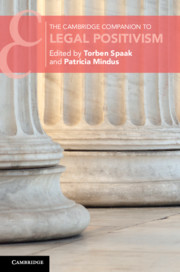Book contents
- The Cambridge Companion to Legal Positivism
- Cambridge Companions to Law
- The Cambridge Companion to Legal Positivism
- Copyright page
- Contents
- Figures
- Contributors
- Acknowledgements
- 1 Introduction
- Part I Fundamentals
- Part II History
- Part III Central Figures
- 9 Jeremy Bentham and the Origins of Legal Positivism
- 10 John Austin
- 11 The Normative Power of the Factual: Georg Jellinek’s Phenomenological Theory of Reflective Legal Positivism
- 12 Hans Kelsen’s Non-Reductive Positivism
- 13 The Legal Positivism of H. L. A. Hart
- 14 From Savigny to Linguistic Analysis: Legal Positivism through Bobbio’s Eyes
- 15 Joseph Raz’s Approach to Legal Positivism
- 16 Bulygin’s Analytical Legal Positivism
- Part IV Main Tenets
- Part V Normativity and Values
- Part VI Critique
- Index
- References
12 - Hans Kelsen’s Non-Reductive Positivism
from Part III - Central Figures
Published online by Cambridge University Press: 21 January 2021
- The Cambridge Companion to Legal Positivism
- Cambridge Companions to Law
- The Cambridge Companion to Legal Positivism
- Copyright page
- Contents
- Figures
- Contributors
- Acknowledgements
- 1 Introduction
- Part I Fundamentals
- Part II History
- Part III Central Figures
- 9 Jeremy Bentham and the Origins of Legal Positivism
- 10 John Austin
- 11 The Normative Power of the Factual: Georg Jellinek’s Phenomenological Theory of Reflective Legal Positivism
- 12 Hans Kelsen’s Non-Reductive Positivism
- 13 The Legal Positivism of H. L. A. Hart
- 14 From Savigny to Linguistic Analysis: Legal Positivism through Bobbio’s Eyes
- 15 Joseph Raz’s Approach to Legal Positivism
- 16 Bulygin’s Analytical Legal Positivism
- Part IV Main Tenets
- Part V Normativity and Values
- Part VI Critique
- Index
- References
Summary
“Green defends a ‘Kelsenian’ non-naturalist and non-reductive version of legal positivism that, he argues, is similar to the pure theory of law expressed in Hans Kelsen’s works. Kelsen is a peculiar legal positivist by Anglophone standards because he rejects the social thesis. As Kelsen sees it, law does not ultimately depend upon social facts about a community’s legal practices. The legal order is normative and so stands outside the spatiotemporal and causal world of nature. Nevertheless, Kelsen can be described as a positivist for two reasons. First, he accepts the separation thesis: law does not ultimately depend upon moral facts. Second, he accepts what Green calls the ‘positivity thesis’. Green argues that the heart of the Kelsenian argument against the social thesis is a form of legal anti-psychologism that is similar to the logical anti-psychologism offered by Frege. A challenge to this Kelsenian position is the view that the non-natural facts upon which legal inferences are based concern the concept of law, not a legal order. Green argues that this approach can be successfully resisted by invoking Kelsen’s doctrine of the unity of law.”
- Type
- Chapter
- Information
- The Cambridge Companion to Legal Positivism , pp. 272 - 300Publisher: Cambridge University PressPrint publication year: 2021

